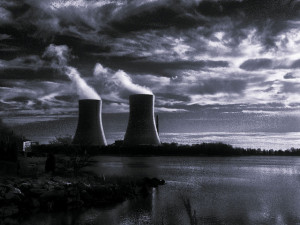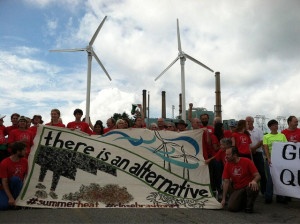We have much more to do and your continued support is needed now more than ever.
New England’s Dirtiest Power Plant to Shut Down! What’s Next?
There are certain moments along this road toward a clean and responsible energy future – moments that make the climb feel a little less steep. On Monday, Massachusetts gave us one of those moments:
A Massachusetts power plant recently cited by federal regulators as one of the state’s heaviest polluters is planning to shut down.
Owners of the coal-fired Brayton Point Power Station in Somerset filed papers Monday indicating the plant will no longer provide power to the region’s electricity grid when it is retired as of May 2017.

Brayton Point has long been a menace to wildlife along Massachusetts’s South Coast. For years it sucked water out of Mount Hope Bay, used it for cooling, and then dumped the heated water right back into the Bay. The result was degraded habitat for local cold-water species and new sightings of warm-water fish that had no business in the Bay. Brayton Point’s “solution”: two 500-foot-tall cooling towers that now tower over the region. But the plant continued spewing dozens of pounds of mercury into the air each year, threatening public health and contaminating the area’s world-class fishing grounds.
This is a big moment – let’s get it right.
In an effort as trying as shifting our national energy portfolio away from dependence on the multi-billion dollar fossil fuel industry, it can be tempting to celebrate these beautiful moments as chances to simply coast in glory, but these are the times in which we must pedal the fastest.

Closing Brayton Point is a huge win. And in the big picture, it’s a small taste of what staying the course offers to bring. We spend a lot of time advocating for environmental regulations that hold polluters accountable for their emissions, and hopefully, ultimately, keep them from polluting in the first place. On Monday, Brayton Point served some serious motivation to those who have spent whole careers lobbying to get this right. This was a chapter. Now, we get to write the next one. In this new chapter: coal-fired power plants are no longer economically viable in the U.S.; and offshore wind leaders are eager to launch an industry that will revitalize coastal economies, provide long-term jobs, and grant us the stability of a resource that can never be depleted.
May Brayton Point’s closing tell everyone who still needs to hear it that we are striding forward. Thanks to Massachusetts, to brilliant advocacy efforts, and to effective regulation, the road just got a little brighter.
![]() Urge your leaders on Capitol Hill to pass the Incentivizing Offshore Wind Power Act, and help replace Brayton Point’s power with the clean energy blowing off our shores!
Urge your leaders on Capitol Hill to pass the Incentivizing Offshore Wind Power Act, and help replace Brayton Point’s power with the clean energy blowing off our shores!





















